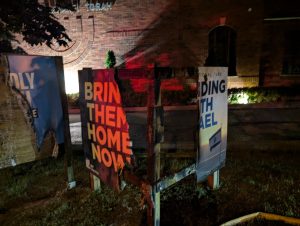MONTREAL — Two years after the project was announced, architects have been chosen by the City of Montreal to renovate the gazebo on the eastern slope of Mount Royal that is to be named for the late Mordecai Richler.
In June 2011, on the eve of the 10th anniversary of the writer’s death, the administration of then-mayor Gérald Tremblay promised to pay tribute to Richler by restoring the more than 80-year-old structure and naming it for him.
The project was to be completed by the summer of 2012. To this day no work has been done on the gazebo, which has continued to deteriorate.
It received no publicity at the time, but on Aug. 21 the city’s executive committee approved the bid by the architectural firm of Beaupré Michaud et Associés to draw up plans for “Pavillon Mordecai-Richler.”
The firm was the only tender, and the executive committee approved a maximum budget of $57,753.37, taxes included, for its work.
This information only came to light after The CJN asked councillor Marvin Rotrand, the prime mover behind the campaign to have the city honour Richler by naming a public place after him, what progress, if any, had been made on the project.
No time frame for the submission of the architectural plans was made known.
The decision to honour Richler this way was made after months of public discussion on whether and how his native city should officially remember him.
Proponents, led by Rotrand, as well as fellow councillor Michael Applebaum, suggested a street in the St. Urbain Street area be renamed for Richler, while opponents, most vocally the St. Jean Baptiste Society and other nationalists, were against any recognition, denouncing Richler as an “anti-Quebec racist.”
The gazebo was chosen by the city’s executive committee because of its proximity to the neighbourhood Richler grew up in and made famous in his novels.
Helen Fotopulos, the then-executive committee member responsible for culture and heritage, envisioned the former renewed bandstand becoming a “speaker’s corner,” a suitable memorial for a man known for his outspoken views.
Some felt the choice was inadequate for someone of Richler’s literary stature, but his widow Florence said it was a fitting tribute.
Rotrand and Applebaum, who represented the Côte des Neiges-Notre Dame de Grâce borough, collected 2,475 signatures on a petition in favour of naming a public place in honour of Richler, although there was little interest expressed in the Plateau Mont-Royal borough where the fictional Duddy Kravitz and Jake Hersh lived.
The gazebo, located in Jeanne Mance Park, known as Fletcher’s Field in Richler’s youth, was built in 1928. The octagonal wooden structure is distinguished by its pyramid-shaped tin roof and wrought-iron balustrade.
Meanwhile, at McGill University, novelist and playwright Anosh Irani has been named the Mordecai Richler Writer-in-Residence in its English department this fall.
On the 10th anniversary of Richler’s death, the McGill Faculty of Arts established the program in both the English department and Département de la langue et littérature françaises. An accomplished anglophone and francophone writer are to be appointed each year to the two departmental positions. A francophone writer has not yet been announced for this year.
The Indian-born Irani, who moved to Vancouver in 1998, is the author of the novels The Cripple and His Talismans and The Song of Kahunsha, as well as the play Bombay Black, among other works.
In 2000, Richler, who never graduated from any college, was awarded an honorary doctorate by McGill.






